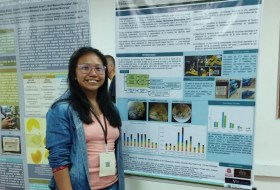News
Student from Unicauca presents their research on conifers in southwestern Colombia.
Lina Marcela Anacona presented her thesis titled 'Characterization of mycorrhizae associated with Podocarpus oleifolius in southwestern Colombia' during the III International Symposium on Mycorrhiza Research in South America.
Lina Marcela Anacona, a student from the Forestry Engineering program at the University of Cauca, was selected to participate in a Bioinformatics course from August 24th to 30th in Leticia (Amazonas), as part of the III International Symposium on Mycorrhiza Research in South America, organized by the Amazonian Institute of Scientific Research (SINCHI) and the National University of Colombia Amazonia Headquarters.
During the event, the student from Unicauca presented the progress of her thesis work, directed by professors Paola Torres Andrade and Adriana Corrales, with support from Smurfit Kappa Cartón de Colombia. This research is being carried out in the Applied Silviculture Seedbed, led by Professor Jorge Ramírez from the Forestry Engineering program.
The purpose of this research is to characterize the mycorrhizal communities associated with Podocarpus oleifolius, located in the Andean region of southwestern Colombia. This plantation was established in 1998 by the company Smurfit Kappa Cartón de Colombia S.A. in the municipality of Sotará, in the department of Cauca.
"Podocarpus oleifolius is a conifer that grows in acidic, sandy soils with low nutrient levels. Its ability to acquire minerals and grow is intrinsically linked to the presence of arbuscular mycorrhizal fungi found in the nodules of its roots," explained Professor Paola Torres Andrade.
In Colombia, there has been observed a decrease of over 30% in Podocarpus oleifolius populations in the last three decades, and in much of its distribution area, habitats are deteriorated, leading to its classification as a vulnerable species. Although there have been previous studies on this species, they have focused on its ecology, silvicultural management, conservation strategies, taxonomy, morphology, and wood characteristics.
"However, information about mycorrhizal communities associated with P. oleifolius plantations is scarce or nonexistent, which motivated the realization of this study." The experimental plantations in the Cauca forests represent a valuable opportunity to determine and describe mycorrhizal communities in various topographic gradients, as well as to understand their relationship with nutrient availability for plants.


